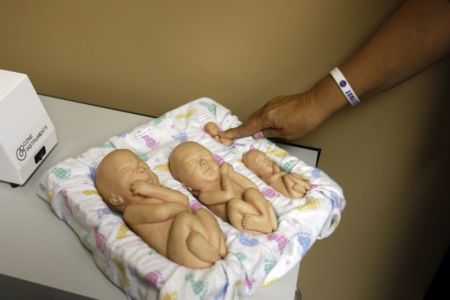Indiana can require abortion clinics to cremate or bury aborted babies, 7th Circuit rules

A federal appeals court has revived a challenged Indiana law requiring aborted babies' bodies to be cremated or buried, rejecting the idea that fetal remains are comparable to medical waste.
A three-judge panel of the 7th U.S. Circuit Court of Appeals issued a unanimous ruling on Monday reversing a lower-court decision against 2016 Indiana's fetal remains law.
The court rejected the argument that the fetal remains law, which prohibits abortion clinics and hospitals from incinerating fetal tissue as medical waste, violates the conscience of two women who had undergone abortions and did not want the fetal remains buried or cremated.
"Indiana does not require any woman who has obtained an abortion to violate any belief, religious or secular. The cremate-or-bury directive applies only to hospitals and clinics," the panel opinion written by Judge Frank Easterbrook, a Ronald Reagan appointee, states.
"At all events, a moral objection to one potential implication of the way medical providers handle fetal remains is some distance from a contention that the state compels any woman to violate her own religious tenets."
Easterbrook rejected the arguments of the two plaintiff physicians who did not want to inform patients about the statutory requirements of the fetal remains law.
"As for the requirement that physicians and other providers tell patients about the statutory options: no one contends that the required notice is false or misleading," continued the panel opinion.
"Physicians must tell patients about drugs' side effects and provide information that enables informed consent to risky procedures such as surgery. Nothing in [Supreme Court precedent] implies that similar notice requirements violate the Constitution."
Indiana Right to Life President and CEO Mike Fichter said he is "thankful Indiana's law requiring the humane burial or cremation of aborted babies is back in effect."
"The Seventh Circuit is making it clear challenges like the one brought against Indiana's law will no longer succeed in federal court, following the Supreme Court's full reversal of Roe vs. Wade in its Dobbs decision," Fitcher said in a statement. "We thank Attorney General Todd Rokita for moving swiftly to defend Indiana's law before the Seventh Circuit."
The attorney representing the plaintiffs, Rupali Sharma of the Lawyering Project, said her clients are weighing a possible appeal.
"We are currently exploring all options with plaintiffs to ensure abortion patients can get the care they need with the dignity they deserve," stated Sharma, as reported by Reuters.
In September, U.S. District Judge Richard L. Young of the Southern District of Indiana, a Clinton appointee, ruled the fetal remains law was unconstitutional.
"Plaintiffs have proved the fetal disposition law burdens their sincere religious and moral beliefs of treating aborted fetuses as medical waste," wrote Young.
"After taking the evidence in the light most favorable to Indiana, Plaintiffs have shown that the object of the statute is to prevent them — and those with similar beliefs — from treating aborted fetuses as medical waste."





















